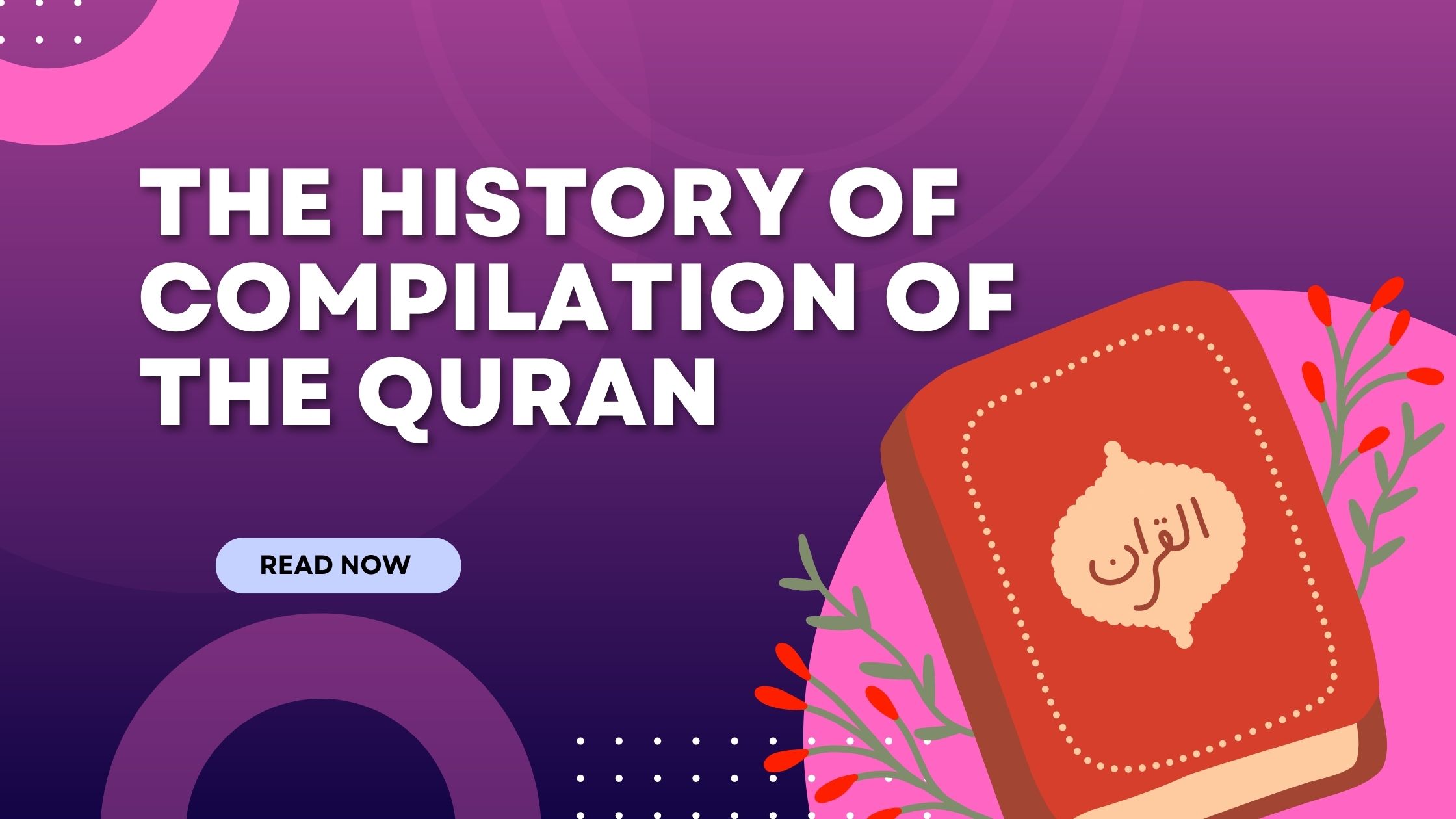The compilation of the Quran was one of the crucial matters that focused the companions’ minds after its revelation. They believed in each verse Allah revealed to the prophet Muhammed (PBUH) and realized the Quran is the ultimate guide of Muslims.
Allah didn’t send down the Quran all at once. Revelation’s period was 23 years. He sent down the verses from one time to another for many purposes centered around Islam teachings.
The compilation of the Quran, undertaken in the wake of its revelation, became a pivotal concern for the companions of Prophet Muhammad (PBUH). Spanning over a period of 23 years, Allah revealed the Quran gradually to Prophet Muhammad (PBUH) for various purposes central to Islamic teachings. Notably, the Quran’s preservation was divinely ordained, as stated in Surah Al-Hijr (15:9), ensuring its safeguarding for over 1400 years.
The history of the Quran’s compilation began after the Yamama Battle in 632 AD, where many Quranic memorizers were martyred, raising concerns about the potential loss of Quranic texts. Initiated by Umar Ibn Al Khattab (RA) and executed under the supervision of Abu Bakr Siddiq (RA), the compilation aimed to safeguard the Quran from errors and loss. Comprising various stages, including authenticating Quranic verses and meticulous proofreading, the process culminated in the compilation of the Quran during Abu Bakr’s reign, supervised by scribe Zayed bin Thabet (RA).
Subsequent caliphates, including that of Usman Bin Affan, witnessed further refinements to the Quran’s compilation, particularly to address linguistic variations among newly converted Muslims. Under Usman’s reign, a committee of esteemed companions, including Zaid bin Thabet, standardized the Quran’s script and pronunciation, ensuring its uniformity across the expanding Muslim empire. This meticulous process, spanning generations of dedicated scribes and companions, resulted in the preservation of the Quran in its original form, laying the foundation for Quranic learning and recitation to flourish worldwide.
The revelation of the Quran wasn’t only its miracle but also saving it over 1400 years by Allah:
{Indeed it is We who have sent down the reminder (the Qur’an), and indeed it is Us who shall preserve the Quran}
(Surah Al-Hijr 15:9).
You can learn about the Quran’s compilation details through this article.
Table of Contents
History of the Compilation of the Quran
After the Yamama Battle in 632 AD, many companions who retained the Quranic verses were martyred.
Therefore, there were concerns about losing Quranic texts, which prompted the compilation of the Quran to preserve it from loss and errors.
Umar Ibn Al Khattab (RA) had the idea of compiling the Quran. He suggested it to Abou Bakr Siddiq (RA), who was the Caliph of the Muslims, after prophet Muhammed’s (PBUH) death.
Abu Bakr Siddiq (RA) hadn’t witnessed the compilation of the Quran at the time of the prophet Muhammed (PBUH) so he didn’t accept the idea in the beginning, then he tasked the scribe Zayed bin Thabet (RA) to compile the Quran portions.
In the beginning, the companions wanted to authenticate the Quran verses before collecting them. So they started to check out the Quranic texts.
Each one of the companions had to make sure they were free of errors and proofread the mistakes.
Stages of the compilation of the Quran
The compilation of the Quran started at many stages from the Time of the Prophet (saw) and beyond:
1. Writing the revealed verses at the time of prophet Muhammed
The factor that helped the companions to compile the Quran was writing down each verse and surah that Allah revealed on different materials such as stones, papers, palm leaves, and pieces of leather.
On the other side, the companions had a strong memory that helped him to retain many Quranic verses.
Several scribes of companions contributed to writing down the Quran as Zaid bin Thabet (RA) during the lifetime of prophet Muhammed (PBUH).
2. Compiling the Quran in the reign of Abo Bakr Siddiq
Killing hundreds of companions who memorized the Quran in the Yamamah battle is the main reason behind compiling the Quran, which happened in the region of the Caliph Abu Bakr Siddiq (RA).
The process of the compilation of the Quran happened under the supervision of Zayed bin Thabet (RA).
He collected materials that contained Quranic verses besides writing down the verses from Muslims who retained some verses. The purpose of compiling the Quran is to collect all the surahs after proofreading all the verses.
Until his death, Umar Ibn Al Khattab (RA) kept the collected Quran. Then his daughter Hafsah kept it. She was one of the most prominent contributors to compiling the Quran during her father’s reign.
3. Compiling the Quran during the reign of Usman Bin Affan
Compiling the Quran didn’t pause in the reign of Abo Bakr Siddiq (RA) and Umar bin Khattab (RA). It resumed and updated during the reign of Usman bin Affan.
This period was a different stage of compiling the Quran. It witnessed the spread of Islamic conquests that expanded the Islamic state. This expansion led to new Muslims speaking different languages and dialects.
Non-Arabic Muslims would recite the Quran with mistakes in pronunciation due to their non-Native Arabic tongue. This difference resulted in a conflict between new Muslims. It prompted Usman bin Affan to standardize the Quran and compile it into one book in a more clearer way to suit the new expansion and the needs at that time.
He asked for sending the Quran scriptures from Hafsa (the wife of the Prophet AS). Then he ordered to copy the Quran in several Mushafs (written books).
The companions who were charged in this process were: Zayed bin Thabet, Abdullah bin Al-Zobier, Saied bin Alas, and Abdulrahman bin Hareth (they are big names in Islamic history). They ensured the authenticity of the material by cross-referencing it with the memories of the Prophet’s companions who had memorized the Quran in its entirety.
The compilation was conducted with great care and precision, ensuring that each verse was organized according to its revealed order. The standardized script used was the Quraishi dialect (The Prophet’s dialect) of the Arabic language, the dialect in which the Quran was originally revealed.
Once the compilation was complete, multiple copies of the standardized Quran were made and sent to major Muslim centers across the expanding Islamic empire. These copies served as authoritative references for recitation, ensuring the preservation of the Quran throughout the Muslim world.
Usman bin Affan (RA) ended the conflict between the non-Arab Muslims by copying Usman Mushaf into several ones and spreading them across the countries.
You can learn how to pronounce the Quranic verses perfectly with tajweed rules with professional instructors through the Quran online with tajweed courses.
Read Aslo, Who Compiled The Quran?
Importance Compilation of The Quran In The Time Of Hazrat Usman?
The compilation of the Quran during the time of Hazrat Usman (Uthman ibn Affan) is an important event in Islamic history. Hazrat Usman was the third caliph of Islam, ruling from 644 to 656 CE. His caliphate witnessed the rapid expansion of the Muslim empire and an increasing number of non-Arab Muslims.
Hazrat Usman took the initiative to compile a standardized version. He appointed a committee of skilled scribes, headed by Zaid ibn Thabit, a close companion of the Prophet Muhammad and one of the primary scribes of the revelations during his lifetime.
Hazrat Usman’s compilation played a crucial role in preserving the Quran in its original form and language. It eliminated potential variations and discrepancies, ensuring that Muslims had access to a consistent and authentic version of the Quran regardless of their geographic location. This compilation became the basis for the preservation of the Quran for generations to come.
Some courses you could be interested in:
- Learn Quran Online With Tajweed For Kids And Adults
- Best Arabic Online Course
- Islamic Studies Online Courses
- Best Noorani Qaida Online Course
Importance of Compilation of Quran
There are many important factors in the compilation of the Quran:
- The Quran became the major source of religion, and the compilation saved Muslims from misguidance.
- Saving the Quran from any form of distortion.
- Compiling was one of the main reasons for the unification of Muslims around the Quran.
- Easing Quran’s learning Quran for future generations.
How was the Quran revealed?
When Allah revealed the Quran in the beginning to the prophet Muhammed (PBUH), angel Jibrel transmitted the verses to the messenger.
Angel Jibrel recited the verses to prophet Muhammed (PBUH) and taught him how to recite them properly.
Quran’s revelation wasn’t only through the angel Jibrel. Allah sent it down in the form of a dream. Prophet Muhammed (PBUH) dreamed of entering the holy mosque with his companions.
Prophet Muhammed’s (PBUH) dream came true. Allah said
{Certainly Allah has fulfilled His Apostle’s vision in all truth: You will surely enter the Sacred Mosque, God willing, in safety and without any fear, with your heads shaven or hair cropped. So He knew what you did not know, and He assigned [you] besides that a victory near at hand}.
(27:48 Al Fath).
What is the difference between the Compilation and Standardization of the Quran?
There were differences between complication and standardization. The main difference between compilation and standardization is the time of the stage. You can excel between them in the following variations:
Compilation of Quran
- The complication of the Quran occurred in the reign of Abu Bakr (RA). It was suggested by Umar bin Al Khattab (RA).
- The major process of compilation was collecting all the written parts of the Quran to save the verses from loss.
- The compilation of the Quran was to collect Quranic portions that were written under the instructions of the Prophet (saw) in a single volume.
- Zaid bin Thabet (RA) was in charge of compiling the Quran by order of Abou Bakr Siddiq.
Standardization of Quran
- Standardization of the Quran was in the reign of Usman bin Affan (RA). It was recommended by Hudhaifa bin Al-Yaman (RA).
- The process of standardization was pronunciation-based consolidation. It led to generate six copies of the Quran.
- Four scribes of the Quran (assigned originally to write the revelation by the Prophet himself) of companions were responsible for standardization. They were: Zaid bin Thabet, Said Ibn Aas, Abdullah Ibn Zubair, and Abdulrahman Ibn Thabet.
Has the Quran been Changed During Compilation?
The Quran that was gathered at the time of Abu Bakr was the collection of the written objects of the revelation that was written under the instructions of the Prophet himself. The standardization at the time of Uthman (ra) was just copying what existed in the originally written objects producing several copies and spreading them across the empire. So everything is just a reflection of the original revelation.
The above point is important!
The Quran has not been changed across the time of compilation, the process was rather to ensure that everything is going fine:
- The Quranic texts we find at present are the same since the revelation of the Quran over 1400 years ago without an increase, shortage, or even a misrepresentation of words.
- Protecting the Quran from a dissertation is proof of Allah’s promise in the Quran {Indeed it is We who have sent down the reminder (the Qur’an), and indeed it is Us who shall preserve it} (Surah Al-Hijr 15:9).
Hadith about the Compilation of the Quran
When the memorizers of the Quran were martyred in the Al-Yamama battle, Abu Bakr Siddiq said to Zaid bin Thabet:
You should search for the fragmentary scripts of the Qur’an and collect them (in one Book) to compile the Quran.
Zaid bin Thabet explained his role in compiling the Quran, as he said:
So I started compiling the Qur’an by collecting it from the leafless stalks of the date-palm tree and the pieces of leather and hides and the stones and from the chests of men (who had memorized the Qur’an”.
(Sahih Bukhari).
Learn Quran Online With Bayan al-Quran:
Embark on a transformative journey of Quranic learning with Bayan Al-Quran’s comprehensive online courses. Our platform offers an authentic and immersive experience tailored to learners worldwide. Whether you’re a beginner or seeking to enhance your skills, our Tajweed courses provide expert guidance and structured learning to master the art of Quranic recitation.
🎓 Expert Guidance:
Benefit from experienced instructors who specialize in Tajweed, breaking down complex rules into manageable segments for learners of all levels.
✨ Key Features:
- Structured, step-by-step learning approach.
- Access to high-quality instructional materials.
- Real-time feedback from qualified tutors to enhance your practice.
- Flexible learning schedules to accommodate your pace and convenience.
- Immerse yourself in the melodious tones of Quranic recitation, enriching your spiritual experience.
🌟 Why Choose Bayan Al-Quran?
Join our vibrant community dedicated to perfecting Quranic recitation. Build a profound connection with the divine words of the Quran and enrich your spiritual journey. Choose Bayan Al-Quran for a transformative learning experience and embark on a path to mastering Tajweed with confidence.
Learn More About Seerah with Bayan al-Quran Islamic Studies Course.
Conclusion
Compiling the Quran occurred during the reign of Abu Bakr Siddiq (RA) to save the Quran from loss. The manuscripts of the Quran remind with Abu Bakr Siddiq (RA) and then remained with Hafssa bint Umar.
When Usman bin Affan became the caliph of Muslims, he ordered the scribes of companions to standardize the Quran and unify its pronunciation.


















